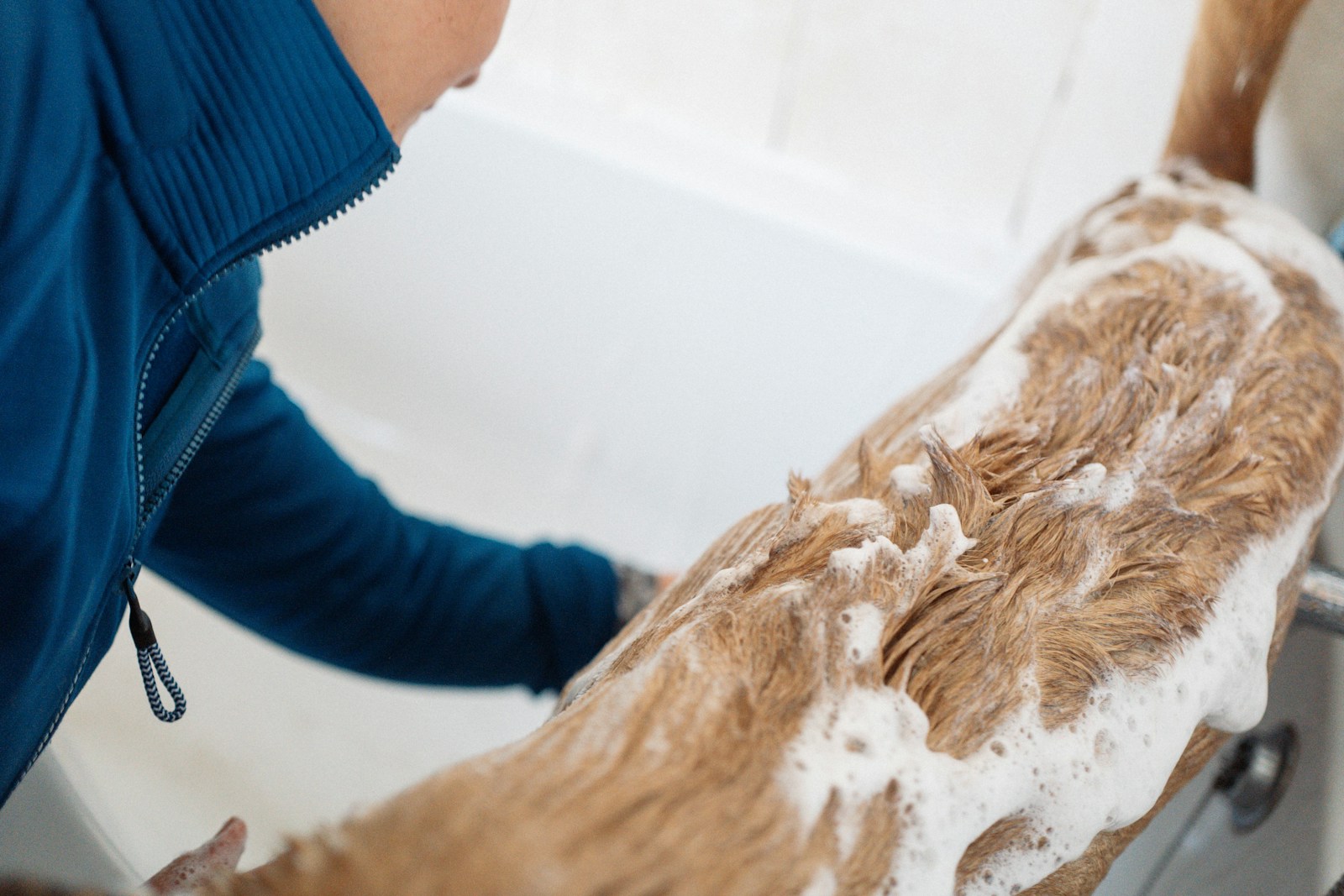Imagine your dog wagging their tail, their fur full of bubbles, followed by those amusing post-bath zoomies. For pet lovers today, giving your furry friend a bath is much more than a simple necessity—it’s a chance to shower them with love and the best in grooming care. Using the right pet shampoo is crucial, not just for keeping your pet clean, but for supporting their skin and coat health. In this guide, we’ll help you understand which shampoo is right for your pet, introduce you to popular products, and share handy tips—plus, we’ll spotlight Jet Pet Resort’s expert bathing services to make every bath-time memorable.
What Are Pet Shampoos?
Pet shampoos are special liquid cleansers created just for animals. They’re different from shampoos for people because animals’ skin is different from ours. Regular human shampoos can upset your pet’s natural pH balance and cause irritation. Today’s pet shampoos are developed using insights from veterinary science and years of study in animal grooming. Modern formulas are thoughtful, ranging from deep cleaners for muddy dogs to gentle blends for pets with sensitive skin, and often include natural oils and moisturizing ingredients for extra comfort.
The pet shampoo market has come a long way. In the past, formulas were harsh and didn’t always suit pets’ unique needs. Modern shampoos use plant-based ingredients and gentle moisturizers in line with the latest knowledge. Many even reflect values that are important to pet owners, like eco-friendly production and natural recipes.
Why Bathing Your Pet is Important
Bathing your pet isn’t just about washing off the dirt. It’s about protecting their health and happiness, too. Giving your pet a regular bath can:
- Remove dust, pollen, loose hair, and pests from their coat
- Fight bad smells and leaves the fur shiny
- Stop skin problems or calm down skin that is already itchy or irritated
- Help build trust and deepen your bond with your pet
Types of Pet Shampoos
Shampoos for Skin Conditions
Some shampoos are made for pets with skin problems, such as excess oil, rashes, or fungus. These medicated shampoos use special ingredients like oatmeal and healing agents to target those issues specifically.
Shampoos for Sensitive Skin
If your pet has sensitive skin, you’ll want a gentle, hypoallergenic shampoo. These formulas skip ingredients like parabens, fake scents, or dyes and instead offer soothing ingredients like aloe vera and oatmeal.
Odor-Fighting Shampoos
For pets who have a strong doggy smell, there are shampoos that fight tough odors. Many of these products keep your dog fresh with light, natural extracts such as citrus oils, helping the clean scent last longer.
Flea and Tick Shampoos
During certain seasons when fleas and ticks are a worry, medicated shampoos with pest-fighting ingredients come in handy. Always be sure to follow the directions, since using too much can harm your pet.
Color-Enhancing Shampoos
For pets with striking fur colors—whites, blacks, reds—some shampoos promise to highlight and help maintain your pet’s natural shade, all while caring for their delicate skin.
Waterless and Dry Shampoos
Busy day or have a pet that dislikes water? Dry shampoos, which come in spray or foam, let you clean your pet without any need for a rinse. They’re perfect for quick cleanups or for pets who have difficulty with water baths.
Latest Pet Shampoo Trends
Pet owners now look for more than just a cleaning effect—they want wholesome care. Current popular trends include:
- All-natural formulas: There’s a higher demand for plant-based ingredients like aloe, coconut, oatmeal, and chamomile.
- Sustainable packaging: Lots of owners prefer recyclable or biodegradable packaging.
- 2-in-1 blends: Combined shampoo and conditioners save time.
- Breed-specific options: Some shampoos are designed especially for the unique fur of different dog or cat breeds.
Clearing Up Common Myths
A few misconceptions are widespread when it comes to pet grooming:
- Human shampoo can be used on pets: This is actually harmful, since our skin and pets’ skin need different treatment.
- Natural products are always safe: Even plant-derived ingredients can sometimes trigger allergies, so doing a small skin test is always wise.
- Dry shampoo is the same as a bath: Waterless shampoos are great for between-wash refreshers, but they don’t substitute for a proper wash when your pet is very dirty.
Important Stats and Facts
According to recent findings, about 60% of pet owners say the main reason they pick a premium shampoo is to keep their pet’s skin in good shape. Oatmeal and coconut oil are now among the most used ingredients, with owners reporting fewer itching episodes and glossier coats. Brands focusing on skin balance and sensitive skin—like certain neutral-pH formulas—are particularly popular now.
Challenges, Controversies, and the Future
What Needs Work
- Not all ingredients are listed clearly, making it tough for pet parents to know exactly what they’re using, especially with complex blends.
- The rules for pet shampoos differ by location—so some products might not be up to standard in your area.
- Allergens get overlooked, even in formulas meant to be gentle.
Hot Topics in Grooming
- Some shampoos have sneaky harsh chemicals: Sulfates and parabens sometimes slip in, even when packages say “safe” or “natural.”
- Eco discussions are ongoing: People are starting to notice not only packaging problems, but how products are made and the effect they have on the environment.
What’s Next?
- Personalized care: There’s a move toward shampoos tailored for specific breeds or individual skin needs.
- Health-boosting ingredients: The next generation of shampoos will be enhanced with supplements for skin and coat health.
- Educational support: Pet service providers, like Jet Pet Resort, are offering guides and how-tos for good pet hygiene, helping owners make smart choices.
Tried and Tested Recommendations
How to Choose a Pet Shampoo
- Ask your veterinarian if your pet is dealing with chronic skin or coat issues before switching products.
- Read the label—select natural moisturizers like oatmeal, aloe, or shea butter. Avoid heavy chemicals when possible.
- Check reviews to see what other pet owners are saying from real-life experience.
- Test a small patch on your pet before using a new shampoo all over, especially for sensitive pets.
Bathing Made Easy—Best Practices
- Brush your pet thoroughly to get rid of loose fur and knots before starting their bath.
- Use warm, but not hot, water and gently massage the shampoo all over, avoiding the eyes and other sensitive spots.
- Rinse everything out carefully to prevent itchy skin left by soap residue.
- Use towels to dry your pet; stay away from high heat unless they’re already comfortable with blow dryers.
- For convenience and expert care, you could try professional grooming like the services at Jet Pet Resort, commonly using premium shampoos matched to your pet’s needs.
How Often Should You Bathe Your Pet?
- Dogs are usually good with a bath every 4 to 6 weeks, but more frequent washes can help for active or allergy-prone pooches, and less often for breeds without much hair.
- Cats mostly manage their own cleanliness, so baths are rare unless a vet suggests otherwise.
Wrapping Up
Today’s shampoos for dog and pet bathing are about more than getting clean—they combine science, well-being, and even a little luxury. You can easily pick from nourishing natural blends, gentle specialty types, or those offering skin solutions. Think about trying out Jet Pet Resort’s bathing services if you want an expert finish, custom-chosen for your pet.
In the end, the right shampoo is part of building a routine that keeps your pet happy, healthy, and ready for all the snuggly moments after a fun and bubbly bath.





